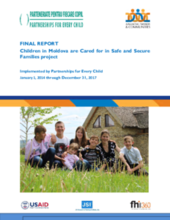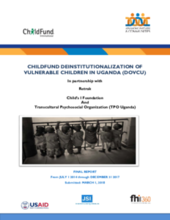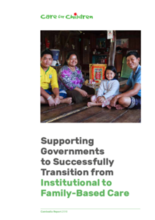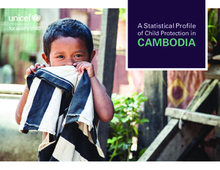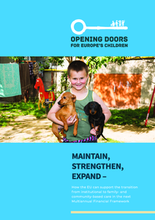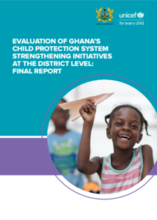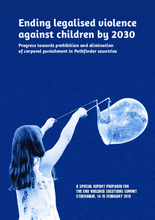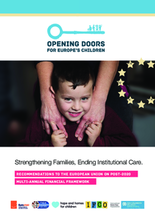Displaying 431 - 440 of 1025
This final report presents key learning, findings, and results of the “Children in Moldova are Cared for in Safe and Secure Families” (Children in Moldova) project.
This final report on the “Deinstitutionalization of Vulnerable Children in Uganda” (DOVCU) project identifies its successes as well as some shortcomings and key learning that is directly relevant to other projects working to support family care for children.
This report provides a summary of research methodology and details of meetings and data collection from an October 2017 research visit to understand the current child welfare system in Cambodia, in particular the role and function of the Government residential care institutions (RCIs). The report presents findings and recommendations for pathways forward for government-led foster care development.
This report, the first of its kind in Cambodia, brings together the dispersed data into a comprehensive profile of child protection in the country.
This publication from Opening Doors for Europe's Children calls upon the EU to maintain, strengthen and expand the use of funds so they make a greater impact and go further to eliminate institutions for children across Europe and beyond.
The objective of this evaluation is to document and assess how the capacity of the child protection system in Ghana—in particular the practices of the Social Welfare Actors (SWA)—has changed to enable the provision of quality services to children and families with support of the workforce strengthening (WFS) initiative.
Prepared for the Agenda 2030 for Children: End Violence Solutions Summit, held in Stockholm, Sweden, on 14-15 February 2018, this report tracks progress towards prohibition and elimination of corporal punishment of children in Pathfinding countries.
This report from Opening Doors for Europe's Children presents recommendations to the EU on how best to include deinstitutionalization and children's care as a part of the next multiannual financial framework.
The 2017 country factsheets provide an update on the status of child protection and care reforms from 16 European countries that are the focus of Opening Doors for Europe’s Children campaign in Phase II.
‘Prepare for Leaving Care – A Child Protection System that Works for Professionals and Young People’, a two-year project co-funded by the Rights, Equality and Citizenship (REC) Programme of the European Union (2017-2018), aims to ensure that the rights of young people in alternative care are respected and that they are prepared for an independent life.

